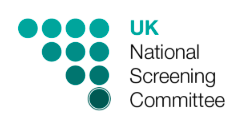April 2023 BSTG meeting notes
Published 1 June 2023
The Blood Spot Task Group (BSTG) held its fourth meeting on 20 April 2023.
1. Presentations on tracking rare disease outcomes
The main focus of the meeting was the BSTG project looking at how disease registries, data linkages and improved data coding could help provide evidence on rare disease outcomes and other metrics. Good outcome data is essential for the UK National Screening Committee (UK NSC) to assess not only if screening would be viable and effective, but also to check that a programme lives up to its promise once introduced.
To help inform the BSTG’s thinking on the direction and scope of this project, the meeting featured 3 thought-provoking presentations that covered a range of conditions and challenges.
The first presentation focused on a study into outcomes for babies diagnosed with congenital hypothyroidism. The study uses data linkage to track outcomes for individuals detected by screening and those detected symptomatically.
The second presentation explained how different data sources are used to track a range of outcomes for babies with one of 4 inherited metabolic disorders (IMDs) – maple syrup urine disease (MSUD), isovaleric acidaemia (IVA), glutaric aciduria type 1 (GA1) and homocystinuria (HCU) – that were added to the NHS Newborn Blood Spot Screening Programme in 2015.
The final presentation focused on how the NHS Sickle Cell and Thalassaemia (SCT) Screening Programme tracks outcomes for babies who have SCT detected by screening. This is done using data from confidential registries and from the SCT newborn outcomes solution web system, which has been in place since March 2021.
BSTG members asked for the National Congenital Anomaly and Rare Disease Registration Service (NCARDRS) and its equivalent organisations in Scotland, Wales and Northern Ireland to be invited to the group’s next meeting before the scope and direction of the outcomes project can be clearly defined.
2. Updates on other projects
The meeting also received updates on the following BSTG projects.
2.1 Comparison between EURORDIS key principles for newborn screening and UK decision making and implementation practices.
Authors of the manuscript comparing EURORDIS principles with UK decision making and implementation practices met with patient and public voice members of the BSTG in February.
They updated the manuscript based on the feedback received and have sought input from additional selected experts before finalising the manuscript and submitting to a peer review journal.
2.2 Providing practical recommendations for diagnostic test accuracy studies for very rare and ultra-rare conditions for consideration in newborn blood spot screening.
Data extraction of methodological papers has been completed for this project. Analysis of the papers is ongoing. Once these findings have been summarised, an expert workshop including members of the UK NSC and the Health Council of the Netherlands will be held. A manuscript will then be drafted for submission to a peer review journal.
2.3 Identifying challenges, opportunities and practical approaches when developing modelling for rare diseases.
A procurement process is under way to commission this piece of work looking at considerations for modelling exercises around newborn screening.
The next meeting of the BSTG will be held in the summer (2023).

